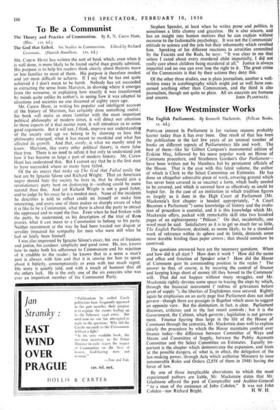To Be a Communist
The Theory and Practice of Communism. By R. N. Carew Hunt.
(Bles. 12s. 6d.) The God that Failed. Six Studies in Communism. Edited by Richard Crossrnan. (Harnish Hamilton. r 25. 6d.) MR. CAREW HUNT has written the sort of book which, even when it is well done, is more likely to be found useful than greatly admired. His purpose is to help his readers think clearly about theories more or less familiar to most of them. His purpose is therefore modest and yet most difficult to achieve. If I say that he has not quite achieved it I don't mean to be harsh. Nobody has yet succeeded in extracting the sense from Marxism, in showing where it emerges from the nonsense, in explaining how exactly it was transformed by minds quite unlike its author's, in seeing how it was adapted to situations and societies no one dreamed of eighty years ago.
Mr. Carew Hunt, in writing his popular and intelligent account of the history of Marxism, has certainly done something useful ; his book will make us more familiar with the most important political philosophy of modern times, it will direct our attention to those aspects of it that matter most, it will introduce us to some good arguments. But it will not, I think, improve our understanding of the society and age we belong to by showing us how this philosophy emerged, what it has meant to mankind and what has affected its growth. And that, surely, is what we mostly need to know. Marxism, like every other political theory, is more false than true. There is no need to refute it but only to understand just how it has become so large a part of modern history. Mr. Carew Hunt has understood this. But I cannot say that he is the first man to have succeeded where so many have failed.
Of the six essays that make up The God that Failed easily the best are by Ignazio Silone and Richard Wright. That an American negro should hate the society he lives in, that he should join a revolutionary party bent on destroying it—nothing could be more natural than this. And yet Richard Wright is not a good hater, and to judge by his essay he is a modest man. None of the incidents he describes is told to reflect credit on himself or make him interesting, and every one of them makes us sharply aware of what it is like to be a Communist, what there is about the party to attract the oppressed and to repel the free. Even when he had broken with the party, he understood, as his description of the trial of Ross proves, what it can mean to a Communist to belong to his party. Neither resentment at the way he had been treated nor disgust at servility impaired his sympathy for men who were still what he had so lately been himself. I was also impressed by Ignazio Silone's essay, his .ove of freedom and justice, his candour, simplicity and good sense. He, too, knows how to make both his adherence to Communism and his rejection of it credible to the reader ; he knows that in a sense a man's past is always with him and that it is unwise for him to speak about it bitterly, contemptuously or even with too much regret. His story is quietly told, and with a touch of humour that all the others lack. He is the only one of the six essayists who was ever an important member of the Communist Party. Stephen Spender, at least when he writes prose and politics, is sometimes a little clumsy and graceless. He is also sincere, and has an insight into human motives that he can explain without recourse to the fashionable psychology. It was not the Communists' attitude to science and the arts but their inhumanity which revolted him. Speaking of his different reactions to atrocities committed by the Fascists and the Reds, he says: " It was clear to me that unless I cared about every murdered child impartially, I did not really care about children being murdered at all." Justice is always impartial and no one can ever lose the right to it. The great crime of the Communists is that by their actions they deny this.
Of the other three studies, one is plain journalism, another a well- written essay in autobiography which might just as well have con- cerned anything other than Communism, and the third is also journalism, though not quite so plain. All six essayists are humane


































 Previous page
Previous page